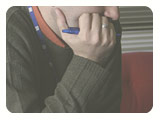Get Tested
Sections:
1)
The Basics
2)
Am I at risk of getting infected? Should I get tested?
3)
The Tests
4)
What if I test positive?? Information you need to know?
5)
What if someone I know / love tests positive? What can I do?
1) The basics: What you should know before getting tested.

HIV (Human Immunodeficiency Virus) is the virus that causes AIDS. People with HIV have what is called HIV infection - they are HIV+. HIV destroys a certain kind of blood cell (CD4+ T cells), which is crucial to the normal, healthy function of the immune system. In fact, the loss of these cells in people with HIV is an extremely powerful predictor of the development of AIDS. Studies have shown that most people infected with HIV carry the virus for many years before enough damage is done to the immune system for AIDS to develop. AIDS (Acquired Immune Deficiency Syndrome) is a condition in which the normal immune system becomes depressed, rendering the affected individual unable to fight a number of serious and fatal infections. People with AIDS may suffer from lung, brain, eye, and other organ disease, along with debilitating weight loss ("wasting"), diarrhea, candidiasis, dementia, toxoplasmosis, and a type of cancer called Kaposi''s Sarcoma.
You may hear people say that HIV does not cause AIDS. This is due to the fact that although the scientific evidence is overwhelming and compelling that HIV is the cause of AIDS, the disease process is still not completely understood. This incomplete understanding, the amount of attention drawn to the virus (both within and outside the medical community), and the controversial social issues surrounding the disease have caused many misleading assertions to be made, and with serious consequences. Infection with HIV has been the sole common factor shared by AIDS patients around the world, and the conclusion after more than 20 years of scientific research is that if you become infected with HIV, it is very likely that you will eventually develop AIDS.
2) Am I at risk of getting infected? Should I get tested?

When thinking about your sexual and reproductive health it is important to be familiar with the risk factors that are associated with certain behaviours. HIV may be passed from one person to another when infected blood, semen, or vaginal secretions come in contact with an uninfected person's broken skin or mucous membrane. A mucous membrane is the term for wet, thin tissue found in certain openings of the human body. These can include the mouth, eyes, nose, vagina, rectum, and the opening of the penis. HIV can also be passed from mother to child through childbirth and the mother's breast milk.

The following are known risk factors for HIV infection. If you answer "yes" to any of these, you should seriously consider seeking HIV counselling and testing.
1. You have injected drugs or steroids or shared equipment (such as needles, syringes, cotton) with others.
2. You had unprotected vaginal, anal, or oral sex with men who have sex with men, multiple partners, or anonymous partners.
3. You exchanged sex for drugs or money.
4. You have been diagnosed with or treated for hepatitis, tuberculosis (TB), or a sexually transmitted disease (STD), like syphilis.
5. You have received a blood transfusion or clotting factor between 1978 and 1985.
6. You have had unprotected sex with someone who may answer "yes" to any of the above statements, or if you have had unprotected sex with someone whose history of risk-taking behaviour is unknown to you.

You must remember that you can NOT tell if someone has HIV by looking at them or assessing if they appear outwardly healthy. The CDC estimates that as many as 1 in 3 people living with HIV don't know that they are infected. Don't be one of them - testing is the only way to tell!
Note: if you plan to become pregnant, counselling and testing are even more important. If a woman is found to be HIV+, medical therapies are now available to lower the chance of passing HIV to the infant before, during, or after birth.
You may be asking yourself if you should get tested after reading this. Honestly, only you can make that decision, but don't forget that there is help out there. You may want to discuss your concerns and risk factors with a therapist, doctor, or HIV/AIDS counsellor. However, in the end, testing remains your choice! To find hotlines and local organizations in your country please
click here
3) The Tests

Once you decide to get tested, you must educate yourself about your testing options. Common testing locations include local health departments, offices of private doctors, hospitals, clinics, and sites specifically set up for HIV counseling and testing. It is VERY important to seek testing at a location that also provides counseling about HIV and AIDS. Counselors can answer all of your questions about risky behavior and ways to protect yourself in the future. In addition, they can help you understand the meaning of your test results and describe what AIDS-related resources are available in your local area.
To find out more why Voluntary Counseling and Testing (VCT) is important please
click here.
You also need to consider when you should test or re-test. This too can be discussed with the testing staff on site. Timing is important when it comes to HIV testing because the test commonly used (the HIV antibody test) doesn't actually detect the virus in your blood. Instead, it looks for the antibodies produced by your body to fight HIV. Most people will develop detectable antibodies within 3 months after infection (the average being 20 days). In rare cases, it can take 6 to 12 months. In the period between exposure and testing, it is important to avoid any behavior that may result in exposure to blood, semen, or vaginal secretions.
Next you should understand the different types of testing available to you. This may differ from country to country - you can find out from your local HIV/AIDS resources and organizations. There is an important distinction that you should be aware of concerning your privacy: confidential versus anonymous testing. Confidential testing is a good option for people who need an official copy of their test result with their name on it. Confidential test results become part of your medical records, which can be released only with your written permission. Anonymous testing leaves no paper trail. When you have an anonymous test, you are known only by a number, and the only person who learns the results is you.
The most common is the HIV antibody test, which is over 99% accurate if performed after the antibody has been biologically developed. This test detects the HIV antibody in the blood of an infected person. The test, once completed, must be sent to a lab and may take one to two weeks to receive results.
If two weeks is too long for you to wait then you may want to look into the Rapid test. Availability of this test may vary. The Rapid blood test produces results in up to 107 minutes and is considered to be just as accurate as the antibody test. Please note that both of these EIA (Enzyme Immunoassay) tests must be confirmed with an additional specific test before a diagnosis of infection is given. Ask your doctor/counselor more about this or
click here to learn about the standard types of HIV tests.

Perhaps the words "blood test" make you shy away from finding out your HIV status. Good news! Not all HIV tests involve the drawing of blood, or even blood at all. Urine and oral-fluid HIV tests offer alternatives for you to use. The urine testing for HIV antibodies is not as sensitive or specific as blood testing. Available urine tests include an EIA and a Western Blot test that confirms the EIA results. The oral test, Orasure, is currently the only FDA approved oral-fluid test. Fluid (not saliva!!) is collected on a small pad that is pressed against the gums. The fluid is derived from the blood and therefore offers an accurate testing sample. Please understand that saliva does not transmit HIV, and in fact can serve to protect the mouth from the virus. You cannot get HIV from someone's sneeze or a kiss. The oral-fluid is also analyzed using an EIA test and a supplemental Western Blot test. You can also find more information about these testing methods on the Your Medical Source link provided above.
4) What if I test positive?? Information you need to know.
It can be very scary to learn that your blood test came back positive, but this result is not a death sentence. The test means that you are infected with the virus that causes AIDS, the human immunodeficiency virus (HIV). Even though there is no cure for HIV disease, there are many new treatments that help keep the disease under control, and a healthy lifestyle can help you stay well. There are now many drugs that treat HIV infection and AIDS-related illnesses. Prompt medical care may also help delay the onset of AIDS and prevent some life-threatening conditions.

When you first find out that you have HIV, you'll need to adjust to this change in your life. Family members or friends might be able to help you, or you could talk with a counselor or social worker. Take your time and don't feel that you have to tell everyone right away about your HIV status. Then start taking action: find out more about HIV, what you can do to maintain your immune system, and what assistance and support are available to you. You can also immediately take a number of important steps to protect your health:
- See a doctor, even if you do not feel sick. Try to find a doctor who has experience in treating HIV.
- Have a TB (Tuberculosis) test done. You may be infected with TB and not know it. Undetected TB can cause serious illness, but it can be successfully treated if caught early.
- Smoking cigarettes, drinking too much alcohol, or using illegal drugs (such as cocaine) can weaken your immune system. Cessation programs are available that can help you reduce or stop using these substances.
- Have a screening test for sexually transmitted diseases (STDs). Undetected STDs can cause serious health problems. It is also important to practice safe-sex behaviours so you can avoid getting STDs.
- Get psychological support with a therapist or HIV counselor and/or join a support group for people living with HIV.
- Consider Anti-retroviral Therapy (ART) - but consult your doctor! You may also want to look into natural alternatives also known as "non-Western" or "traditional" medicine. Choose the treatment plan that makes you feel the most comfortable and offers you the most effective tool in combating the virus. HIV is a virus that can multiply rapidly in your body. Without treatment, HIV can make your immune system very weak. If this happens, you might get an "opportunistic infection." Common germs cause these diseases. People with healthy immune systems can be exposed to these germs and not get sick, but the same germs can cause serious illnesses in people with weak immune systems.
- Monitor your immune function - In addition to your regular medical exams, there are two special blood tests to keep track of HIV disease. They are the viral load test and the T-cell test. Your doctor will probably want to do these tests every three to six months. If your viral load stays low and your T-cell count stays high, you might choose to delay treatment.
- Educate yourself! There are things you can do to stay healthier with HIV disease. You can learn more about the disease, monitor the health of your immune system, and decide how you want to deal with your health. The more you know about what you can do to help yourself the better, but be careful about the information you're getting -- check it out with your doctor or other sources to make sure it's accurate.
Medical Treatment Links:
Although there are many different medications that can help slow down the HIV virus, no one knows exactly when or how best to use them. You will need to get information and work with your doctor to decide what kind of treatments fit best with your beliefs, desires, and life style.
Alternative Therapy Links:
Some people believe they have stayed healthier because they use traditional healing practices, massage, acupuncture, herbs, or other therapies. It can be difficult to get information on how well these therapies work for HIV disease. Most of them are not studied the same way as western medicines. That doesn't mean they don't work, but you may have to find other ways to check them out. Remember, there are no "miracle" cures. If it sounds too good to be true, be very careful.
5) What if someone I know / love tests positive? What can I do?
The best help is love and support, but if you want a more technical guide visit these websites:



